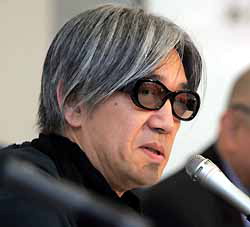
Lingerie manufacturer Triumph International Japan has unveiled a new type of brassiere that can be converted into a shopping bag. Called the "No! Shopping Bag Bra" (NO! reji-bukuro bra), the environmentally-friendly lingerie is designed to promote the reduction of plastic bag consumption, a key objective of the revised Containers and Packaging Recycling Law hammered out by Japanese lawmakers in June.
Each year, Japanese shoppers receive an estimated 30 billion plastic shopping bags, which, in terms of the oil resources needed to produce them, amounts to two giant tankers full of oil (millions of barrels). About 30% of these bags are thrown away without being reused, and since the consumption of plastic shopping bags contributes to environmental problems such as increased energy usage, trash buildup, and global warming due to CO2 released in the garbage incineration process, there are urgent calls to reduce their usage.
When the bra is being worn, the "shopping bag" portions are folded away inside the bra cups, where they serve as extra padding. The bra quickly converts to a shopping bag by removing the bag portions from the cups and connecting the hooks on the bra's underwire. The lace cups serve as decoration along with the shoulder straps, which are disconnected and tied to the top of the bag as ribbons.
The bra -- available in red, blue, green, yellow and pink -- is made from the Teijin Group's ECOPET brand of polyester fiber, which has been recycled from plastic bottles through the company's patented EcoCircle recycling system.
Triumph International Japan has a long history of developing eco-themed bras, with such creations as the Recycle PET Bra (1997), Eco-globe Bra (2004) and Warm Biz Bra (2005).
[Source: Triumph International Japan via Slashdot Japan]



 Japanese scientists researching the prospects of long-term human settlements on Mars are dreaming up ways to address the challenges of Martian agriculture. At a recent meeting of the
Japanese scientists researching the prospects of long-term human settlements on Mars are dreaming up ways to address the challenges of Martian agriculture. At a recent meeting of the 
 At a press conference held in Tokyo on March 23, composer Ryuichi Sakamoto made a public appeal to the government to exempt all secondhand electrical goods from the Electrical Appliance and Material Safety Law (a.k.a. PSE Law, or DENAN). The law, which is set to take effect April 1, will prohibit businesses from selling electrical goods that do not bear the PSE mark (that signifies compliance with the law?s safety standards). In other words, before putting products up for sale, dealers will be forced to file paperwork and perform tests (such as 1,000 volts for one minute) on each and every pre-2002 electrical product in order to obtain a PSE mark. Though the government recently revised the law so that it does not apply to certain "vintage" electric instruments with high scarcity value, Sakamoto called upon the government to expand the exemption to all secondhand electrical goods.
At a press conference held in Tokyo on March 23, composer Ryuichi Sakamoto made a public appeal to the government to exempt all secondhand electrical goods from the Electrical Appliance and Material Safety Law (a.k.a. PSE Law, or DENAN). The law, which is set to take effect April 1, will prohibit businesses from selling electrical goods that do not bear the PSE mark (that signifies compliance with the law?s safety standards). In other words, before putting products up for sale, dealers will be forced to file paperwork and perform tests (such as 1,000 volts for one minute) on each and every pre-2002 electrical product in order to obtain a PSE mark. Though the government recently revised the law so that it does not apply to certain "vintage" electric instruments with high scarcity value, Sakamoto called upon the government to expand the exemption to all secondhand electrical goods.